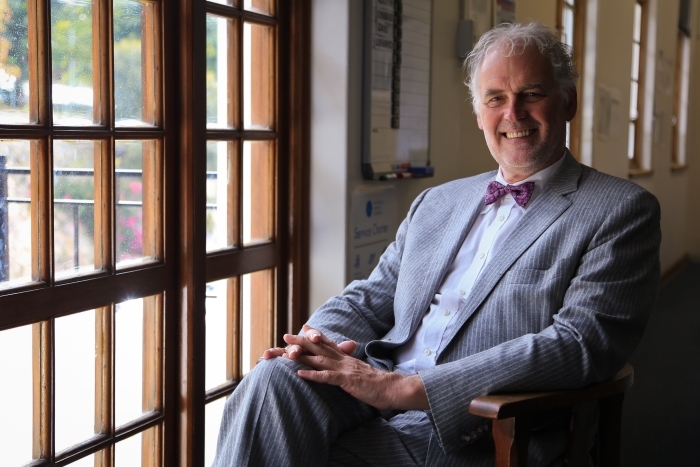Farewell to Walter Baets, the great inspirer
25 May 2016 | Story by Newsroom
Professor Walter Baets is in a reflective mood on the eve of his departure from UCT's Graduate School of Business (GSB).
For the past seven years, Belgian-born Baets has headed up the GSB at the V&A Waterfront, building it into a vibrant place where innovation, inclusive business and the notion of “doing things differently” has taken root.
Baets is off to Aix-en-Provence in the south of France where he will head a new venture called The Camp.
Not a traditional business school, he describes his new venture as an “ecosystem” where business leaders and others will be able to come for residential sessions aimed at transforming their way of thinking about the challenges of the 21st century.
His new role?
“My job title is The Great Inspirer, not Dean,” he says with a smile.
A country of “infinite possibilities”
Baets' decision to relocate from France to Cape Town in 2009 was prompted by his wife's suggestion that South Africa was the place to be.
“This to me is the continent of the future. It has everything – people, fertile ground, raw materials – you just have to get it right. It's a country and a continent of infinite possibilities,” he says.
After a visit to South Africa in 2007 at the invitation of the late Professor Paul Cilliers of Stellenbosch University, he first considered applying for the position of dean of Commerce at the University of the Witwatersrand, but then the directorship at the GSB came up.
It turned into his longest assignment ever – “I have never stayed anywhere that long.”
“Relevant, purposeful, meaningful”
Baets (with the help of his team, he is at pains to stress) leaves the GSB in excellent shape.
Among the highlights of his tenure are a spike in research output, the fact that the GSB enjoys international stature (it is one of just three schools in Africa to be triple-crown accredited) and has 100% black associate professors, which is well above the national average of 12%.
For the past ten years, the GSB has been listed by the Financial Times as one of the top 100 business schools for MBAs in the world, making it the only African institution to enjoy this status.
Along the way, Baets has overseen the creation of several innovative units – like the Bertha Centre for Social Innovation and Entrepreneurship, the MTN Solution Space (which is now being extended into Philippi, one of the most economically deprived areas in Cape Town) and the Allan Gray Centre for Values-based Leadership.
Business, in his view, should be employed as a tool for positive change in society. An example of this is that all MBA students at the GSB have to engage with the Social Innovation Lab, a mandatory course which requires them to work with real people to come up with real solutions to real problems.
“I believe that business and business thinking is the only way to create wealth and it is, per se, neutral. How you use that wealth – that's a matter of choice, not a matter of nature. I am still convinced that business could be a fantastic engine to drive real economic development: creating jobs, creating pride – all those very human things.”
It is in this context that he reflects on his legacy: “I am most proud that we have been able to build a business school that really promotes that purposeful, meaningful way of doing business.”
The chaos paradox
A specialist in the topic of complexity theory, knowledge management and innovation, Baets is the author of several books, the most famous of which is titled in Dutch Wie orde zaait, zal chaos oogsten: een vertoog over de lerende mens (He who sows order, will harvest chaos: an essay on the learning human).
It's in this context that he reflects on issues of transformation that are confronting UCT. The key for substantive change, he suggests, is “fewer rules but relevant rules, fewer meetings but relevant meetings, a smaller Senate but a relevant Senate”.
“I would wish for UCT to really bring itself back to the question of what it is you want this university to do. And then decide, whatever fits that purpose, you are going to do that. If, for example, you want to contribute more to economic development or the alleviation of poverty, then maybe you have to stop teaching a number of courses and have to start creating a number of solution spaces.
“The problem of political correctness is you change nothing,” he adds, in characteristically outspoken fashion.
Bitter sweet
Baets leaves South Africa with mixed feelings.
On the one hand he will be saying goodbye to a comfortable lifestyle in a beautiful setting and he remains fully convinced of the country's potential.
On the other, he is painfully aware that the gap between the rich and the poor in Cape Town is among the highest in the world, which means that to live here you have to somehow “disconnect” from reality. This is something, he says, he will remember but not miss.
And he takes with him a renewed interest in photography – one of his many hobbies. He also plays flamenco guitar and rides a Harley Davidson, but he allowed his private pilot's licence to lapse while here.
“What I like in photography is the story …. I feel you have more of those stories in Cape Town and South Africa – good and bad – as much as you have fantastic nature, which is also a story. The stories are much more telling here, I think, than they are in other places in the world. They come harder on you. They are more visible.”
Story Andrea Weiss. Photo Je'nine May.
 This work is licensed under a Creative Commons Attribution-NoDerivatives 4.0 International License.
This work is licensed under a Creative Commons Attribution-NoDerivatives 4.0 International License.
Please view the republishing articles page for more information.










